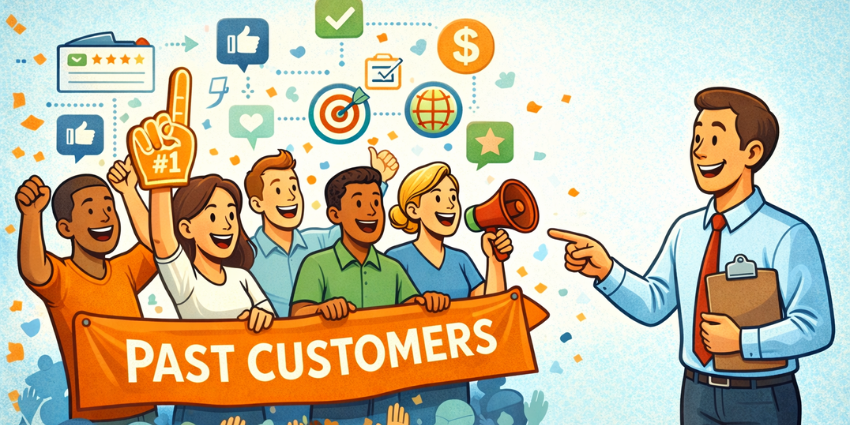It’s not only enterprises that leverage CRM solutions. Indeed, small businesses also leverage the technology to perform various service, sales, and marketing tasks.
After all, a business will only get so far with navigating spreadsheets and workplace apps before it all becomes unmanageable.
A CRM system aspires to create clarity from the chaos, giving firms all the tools (and insights) they need to simplify communication, personalize interactions, and – ultimately – build better relationships.
Yet, some CRM solutions are better suited to small businesses than others…
CRM Solutions for Small Businesses: What Should I Look for?
Typically, a small business requires a system that’s inexpensive, easy-to-use, and scalable.
Yet, these brands should be wary. After all, consumers generally expect more personalized, intuitive experiences from companies with fewer accounts to manage.
To live up to those expectations, the buyer should focus on:
- Integrations: Customer data is probably scattered across emails, spreadsheets, and various other documents. Make sure the system integrates with existing tools so sales, support, and marketing teams have the same insights. It should also integrate with calendar apps, payment systems, and other tools in use.
- Simplicity: The easier a system is to use, the more team members will benefit from it. Look for a solution that’s easy to get up and running in a day without requiring lengthy training and configuration.
- Scalability: CRM technology must scale as the small business grows. Look for a cloud-based system that can handle increasing interactions and features without costly or complex upgrades.
- Self-Service: Many customers prefer solving simple issues independently via FAQs, bots, and self-service portals. Integrated self-service tools will cater to this audience and take some of the pressure off teams.
- Reporting Tools: Look for intuitive reporting tools that cover key metrics across customer service, sales, and marketing.
- Security: Customer data is precious, so ensure the CRM can keep it safe. Look for end-to-end encryption, access controls, compliance certifications, and regular updates.
The Best CRM Solutions for Small Businesses
The following list of CRM solutions features both well-known and emerging providers.
1. Salesforce
Salesforce isn’t always considered among CRM solutions for small businesses, as it generally targets larger enterprises like Amazon, Adidas, and Spotify.
However, Salesforce does have specific solutions for smaller companies, like “Salesforce Essentials”, which offers a guided setup and simple customizations.
As the business grows, Salesforce customers can also expand functionality with apps from the App Exchange while its mobile functionality is also attractive for SMBs.
Salesforce Essentials also comes with a Help Center, which enables customers to find answers to specific queries on their own.
Top Features:
- Einstein Activity Capture: Automatically log sales activities like emails and calendar entries, compiling data in one accessible place.
- Seamless Data Syncing: Import and sync customer data from spreadsheets, emails, calendars, and other sources.
- Einstein Activity Capture: AI-powered automation reduces manual data entry, freeing up time for sales teams.
- Custom Reports & Real-Time Analytics: Gain deep insights into sales performance with customizable dashboards.
| Pros | Cons |
|
Extremely scalable. Intuitive AI tools. Robust reporting capabilities. |
Steep learning curve. Higher pricing. |
Pricing: The Essentials plan starts at $25 per month per user, billed annually.
2. Zoho CRM
Zoho has a long heritage of delivering CRM solutions to SMBs. Despite it now serving many enterprise customers, it hasn’t shied away from its roots.
It’s packed with unique tools, such as the no-code CRM design studio, advanced collaboration features, sales signals, and AI-powered automation capabilities.
Additionally, Zoho is an excellent tool for flexibility, as it integrates with a wide range of applications, such as Google, Zoom, Slack, and Mailchimp.
Top Features:
- Contact and sales management: Store and track customer details, conversations, and pipelines with ease.
- Sales signals: Real-time notifications for identifying potential leads.
- Seamless integrations: One-click connectors for various tools.
- AI automation: Automate routine tasks such as follow-ups, lead scoring, and emails.
| Pros | Cons |
|
Affordable pricing. Feature-rich. Useful automation tools. |
Basic dashboards.
Works best with other Zoho apps. |
Pricing: Free plan available for smaller teams, with standard plans starting at $20 per month.
3. HubSpot
HubSpot is another hard-hitter among CRM solutions for small businesses, thanks largely to its coveted free plan.
Primarily focused on supporting marketing teams, HubSpot simplifies complex promotional tasks, particularly those related to inbound marketing, SEO, and email.
HubSpot is easy to use and highly scalable, with plenty of integration options, flexible payment plans, and modular add-ons for AI capabilities and additional tools.
Top Features:
- Comprehensive Contact & Sales Management: Easily track leads, customer interactions, and sales pipelines.
- Inbound Marketing Tools: Includes SEO optimization, landing page creation, and social media tracking to boost visibility.
- Marketing Analytics Dashboard: Real-time insights on website traffic, lead generation, and email campaign performance.
- Industry-Leading Email Marketing: Advanced tools rival dedicated email marketing platforms.
| Pros | Cons |
|
Extensive CRM and marketing suite. Free version for beginners. Lots of training resources. |
High pricing for advanced features.
Slight learning curve. |
Pricing: Free plan for beginners with premium plans starting at $20 per month per user.
4. Freshworks
With its straightforward interface and convenient AI tools, Freshworks makes it simple to streamline tasks and boost productivity.
It’s also available for free trial, which is also a fantastic feature for small businesses
Freshworks offers tools for all kinds of teams, from customer service to IT staff, and the CRM platform is packed with helpful analytics and insights.
Key Features:
- Multichannel Communication: Engage with customers across various platforms.
- AI-Powered Assistant (Freddy): Freddy AI aids in lead scoring, sales forecasting, and automating routine tasks.
- Customizable Dashboards and Reports: Gain valuable insights into sales performance and customer behavior.
- Workflow Automation: Automate repetitive tasks such as email follow-ups and lead assignments.
| Pros | Cons |
|
Easy to use interface. Scalable for larger businesses. Straightforward AI tools. |
Less-extensive customer support.
Some customization limitations. |
Pricing: Free trial for beginners with paid plans starting at $15 per month per user.
5. Pipedrive
Pipedrive is a sales-focused CRM explicitly designed for small businesses that need an easy-to-use yet powerful system to manage growth.
Emphasizing visualization, automation, and simplicity, Pipedrive helps companies track deals and boost productivity.
There are even built-in tools to automate things like lead research, nurturing, and follow-ups.
Plus, team members can take advantage of comprehensive AI suggestions and guidance.
Top Features:
- Visual Sales Pipelines: Drag-and-drop interface to track deals in real time.
- Timeline View: A clear, structured format that allows businesses to monitor deal progress.
- Smart Contact Data: Automates lead research.
- Seamless Integrations: Connects with Google Meet, Zoom, and more.
- Highly Customizable Workflows: Tailor workflows to specific processes.
| Pros | Cons |
|
Intuitive and beginner-friendly. Affordable pricing. Strong automation features. |
Limited enterprise-level features. No free plan. |
Pricing: Starts at $11.90 per month. Annual plan users get up to 70% off.
6. Monday.com
Monday.com isn’t just one of the best CRM solutions for small businesses; it’s a comprehensive workplace management platform.
Companies can tap into project management, collaboration tools, and CRM features within the same interface.
Although it’s not the same as a traditional CRM, Monday.com still gives businesses all the tools they need to manage leads, automate workflows, and visualize sales performance.
There are also some handy AI tools to assist with project management.
Key Features:
- Lead Management & Tracking: Organize and track sales leads.
- Seamless Email Integration – Send and receive emails directly within Monday.com.
- Automations – Reduce repetitive tasks and improve efficiency.
- Sales Forecasting – Enter deal values and probabilities to generate revenue forecasts.
- Custom Dashboards – Transform raw data into colorful, easy-to-read reports.
| Pros | Cons |
|
Highly visual and customizable. Included AI and automation tools. Flexible additional tools. |
Not a traditional CRM.
Minimum three-user requirement. |
Pricing: Plans start at $12.50 per user per month.
7. Streak
For small businesses that spend a lot of time within Gmail, Streak CRM is a fantastic solution.
Though lesser-known than some of the other top CRM solutions for small businesses, Streak is straightforward, convenient, and works directly within Gmail.
Companies can manage sales, track leads, and organize customer interactions from within their inbox. It’s an excellent tool for smaller teams and even solo entrepreneurs looking for a lightweight CRM.
Top Features:
- Seamless Gmail Integration: Streak is a browser extension that makes it easy to use.
- Pipeline Management: Organize leads and track deals with customizable sales pipelines.
- Task & Contact Management: Add notes, share updates, and collaborate on deals without leaving your inbox.
- Automated Communication – Ensures efficient email tracking and follow-ups.
| Pros | Cons |
|
Extremely easy to use. Perfect for Gmail users. Affordable pricing. |
Limited advanced functionality. Not suited for large teams. |
Pricing: Streak offers a free plan for solo users with basic features, and paid plans start at $15 per user per month.
The Best CRM Solutions for Small Businesses
Finding the right CRM solutions for small businesses can seem like a challenging prospect – but plenty of great, user-friendly, and affordable options exist.
From Pipedrive, with its excellent sales capabilities, to HubSpot, with its scalable design, there’s something for every company.
For more takes on the CRM market, check out the following article: Gartner Magic Quadrant for CRM Customer Engagement Center (CEC) 2024







